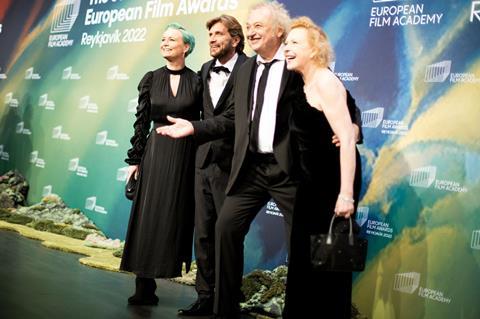
Now almost three years into his role, European Film Academy (EFA) director and CEO Matthijs Wouter Knol has taken great strides in reshaping the academy and its annual awards. This year’s ceremony will take place in Berlin on December 9, with Anatomy Of A Fall, The Zone Of Interest, Fallen Leaves, How To Have Sex and Io Capitano among the titles vying for the main prizes.
From 2026, the ceremony will move from its traditional December slot to mid-January — a shift Wouter Knol says has been a discussion point within the academy for decades. The awards have mostly been held in December since its first edition in 1988. The nominations will still be announced in November, giving voters two months, instead of one, to sift through the films.
“We don’t want people to just watch the most buzzy titles and give their votes to them, which leads to the same titles winning loads of awards and others being overlooked,” says the EFA executive. Last year, Triangle Of Sadness swept four of the five top prizes at the awards (film, director, screenplay and actor for Zlatko Buric), with Vicky Krieps taking best actress for Corsage.
Importance of visibility

As well as being a benefit to rightsholders, offering a larger window to promote nominated films, the date shift will buoy the nominees during the international awards season, etching the ceremony closer to the Golden Globes, the Baftas and the Oscars.
“Some people have said, ‘Won’t you make the European Film Awards a subordinate event to the Oscars?’” Wouter Knol admits. “I don’t see any issue in that, because the visibility and the importance of the Oscars for the international and European film industry is very big. It’s only an advantage of the European Film Awards to become a not-to-miss stopover towards the Oscars.”
Another change from 2026 will be a shift in eligibility dates for nominated films. The exact timeframe has yet to be pinned down by the EFA board and will be announced in 2025, but the current rules stipulate that films must have had their first official screening, at a festival, cinema or online, between June 1 and May 31.
The window allows titles from Berlin and Cannes to compete in one year while it is harder for films from the summer and early fall festivals, including Venice, Toronto and San Sebastian, to qualify. “The aim is for it to be easier for films in the last half of the year and for other films that are not necessarily in festivals, to be included,” Wouter Knol explains, with Quo Vadis, Aida? a notable example of a film that premiered at Venice in 2020, competed in the Bafta and Oscar race in 2021, and then tardily swept up at the European Film Awards in December 2021.
In the wake of EFA’s first-ever membership survey, sent out to its 4,600 members with the results published in October, EFA is also looking to introduce membership chapters. The aim, Wouter Knol says, is to help members “feel more connected and more involved”. Chapters that are linked to the Excellence Awards — cinematography, editing, production design, costume design, make-up and hair, original score, sound and visual effects — will be introduced in 2024, and expanded in the years that follow.
The EFA board membership has also been restructured for 2024 to improve representation from different parts of Europe, with the fresh line-up to be unveiled in December. The developments appear to be paying dividends, with Wouter Knol citing an increased appetite in the industry to join the academy. “For years there was a slow growth,” he says, “but in the past two years, each year we had 400-500 new members.”
How much longer Wouter Knol has in his post to push through further evolution is not set in stone. The Netherlands-born, Berlin-based executive is not on a fixed-term contract so has no formal end-date, and with the Berlinale artistic director position up for grabs, some pundits felt the former director of the European Film Market might be a leading contender to succeed Carlo Chatrian. “I’m not a candidate,” he insists.
For now, Wouter Knol’s mind is focused on the task at hand — delivering a successful awards ceremony that will take place as tensions continue to run high in Europe in the wake of the Israel-Hamas war. He says the academy is prepared, should the ceremony become a platform for protest or political statement.
“Filmmakers will have the chance to speak their mind,” he says. “If we bring filmmakers together, we want to make sure people can address what they want to say.”

























No comments yet